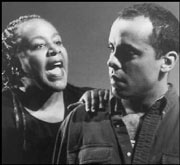YELLOWMAN
ACT Theatre, 700 Union, 292-7676, $10-$44 7:30 p.m. Sun. and Tues.-Thurs.; 8 p.m. Fri.-Sat.; 2 p.m. select matinees ends Sun., Aug. 4
East Coaster Dael Orlandersmith has earned a well-deserved regional reputation in the last few years performing self-penned one-woman shows about the crippling complexities of race and self-hatred. The Gimmick, a James Baldwin-esque piece about the tragic descent of an African-American artist, was hypnotic; Monster was somewhat less so but still a singular piece of writing. Yellowman, the two-person Pulitzer Prize finalist marking Orlandersmith’s third appearance at ACT, is the first chance to put your finger on what hasn’t been working. The play is must-see material, and it’s a beautiful production, but the addition of another player into Orlandersmith’s typically solo reveries uncovers the weaknesses she must address if she is to become the major voice in American theater she could be.
Yellowman is essentially a solo show for two people. Though the performers interact at pivotal plot points, they spend most of their time sharing haunting, memory-laden monologues. When director Blanka Zizka has things rolling at their smoothest (which she usually does, with the busy but vivid help of lighting designer Russell H. Champa), these remembrances allow the leads to move fluidly back and forth between a storytelling present and a past in which they simultaneously observe and inhabit the people who made them what they are.
Orlandersmith plays Alma, a dreamy, big-boned Carolinas girl saddled with a drunken mother and deep black skin that African-American society views as an embarrassing racial heritage. Howard W. Overshown plays Eugene, the light-skinned love of her life who is equally burdened with soused parents, including a dark father who both envies and resents the privileges given to Gene and his mother as a result of their fair hues.
The evening begins with Alma’s elegiac description of her mother, a heartbreaking recollection of a woman’s defeat that exemplifies Orlandersmith’s work at its best. What begins as a physical portrait of the mother sinks into the picture behind the picture, taking in the sweat and toil of an entire generation as well as the love of God and men, and the internal racism that destroys the potential rewards of both. Orlandersmith has a keen instinctual sense of phrasing—the rhythmic way her words meet, group, and then fly off together is dazzling: “I want to glide with this. I want to melt into this,” Alma tells us during her first sexual experience, then, gripped by self- consciousness, asks, “How do I look against these sheets?!” as the repeated phrases form a kind of refrain. The burgeoning decade-long romance of Alma and Gene in this conflicted milieu—and the unsure strength they both possess—forms the heart of the show.
But it doesn’t stay on its complex track the whole time. As a writer, Orlandersmith sometimes indulges in blatant overstatement for dramatic effect. Both The Gimmick and Monster featured a horrifying incident, but here, in a duo format, it’s over the top. A wrenching show that features a dead puppy and a dead fetus has about two dead things too many, if you ask me. And the play’s abrupt, bombshell ending, which seems to betray what we’ve come to believe in Alma, feels phony.
Orlandersmith can also be guilty of a heavy nudge as an actor. I’m not a fan of adult impersonations of children—only Lily Tomlin and Tracey Ullman don’t leave skid marks—and her baby-voiced Alma doesn’t change my mind. She has a tendency, too, to slip into a one-step-removed recital mode when caught in the lushness of her own material. You’d have to be asleep not to be compelled by her imposing presence, but it isn’t quite acting.
The real find here is Overshown; his Eugene is as vital as the language Orlandersmith has given him. He seems to inhabit, rather than imitate, the childhood Gene; his frustrated adult is both poetic and alive. There are no transformational seams between Gene and his people— a shift from the young man into the climactic rage of his despairing mother provides the show’s most powerful moment. Overshown’s performance makes Yellowman a lost soul worth seeking out.
swiecking@seattleweekly.com 








